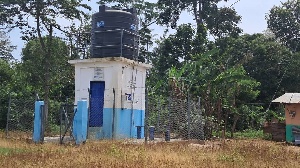- Home - News
- Elections 2024
- News Archive
- Crime & Punishment
- Politics
- Regional
- Editorial
- Health
- Ghanaians Abroad
- Tabloid
- Africa
- Religion
- Photo Archives
- Press Release
General News of Monday, 24 March 2025
Source: www.ghanawebbers.com
From Bushes to Brilliance: How clean water and safe sanitation gave Koensim Girls a future
Koensim M/A Primary and Junior High School in the Oti Region faced many challenges. These issues kept many children, especially girls, out of school. There were no proper sanitation facilities or access to clean water. Students had to fetch water from distant streams, making education a low priority for families.
Plan International Ghana intervened and changed the school's situation dramatically. Enrollment increased from 79 students to 224 in just two years.
**The Struggles of the Past**
Before the intervention, conditions at Koensim M/A were poor. The school lacked toilet facilities, forcing students to go into the bush. Girls faced risks like infections and snake bites during this time. Many missed school during menstruation due to no private changing space.
Headmaster Mr. Benoni Nyasorgbor described the situation as heartbreaking. He noted that teenage girls often stayed home for days each month because of inadequate facilities. The lack of toilets led to frequent sickness among students, discouraging parents from sending their children to school.
Additionally, students had to walk nearly two hours for water before class. This left them exhausted and hungry, leading to irregular attendance and poor concentration.
**A Game-Changing Intervention**
Plan International Ghana recognized the urgent need for change through its I-PADEV project. They aimed to improve sanitation and education aligned with UN Sustainable Development Goals (SDGs).
The organization collaborated with the community to build gender-friendly latrines with separate sections for boys and girls. They also created a dedicated changing room for female students during menstruation. This led to improved attendance, especially among girls who could now attend classes without interruptions.
To address the water crisis, Plan International Ghana constructed a borehole for clean water access. This eliminated long walks for water and reduced waterborne diseases.
Student Adjei Naomi expressed her relief: “Now we have toilets and water; I don’t have to go home because of my period.” She added that they can stay in school without missing lessons.
**Education Beyond Infrastructure**
The intervention included more than just sanitation and water improvements. Plan International Ghana also focused on providing quality learning materials. The school struggled with accessing textbooks under Ghana’s new curriculum.
With support from Plan International Ghana, Koensim M/A now has enough textbooks and teaching resources available. This investment has significantly improved classroom instruction quality.
In 2023, Koensim M/A presented its first batch of students for the Basic Education Certificate Examination (BECE). The school achieved a 70% pass rate that year, which increased to 90% by 2024.
**A Model for Sustainable Development**
The transformation at Koensim M/A Primary and JHS shows how targeted interventions can create opportunities through better sanitation, water access, and education. The once-struggling school is now a symbol of progress.
As Ghana works toward achieving Sustainable Development Goals, Koensim’s story highlights how community partnerships can change lives one student at a time.











